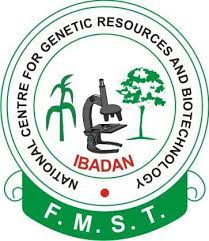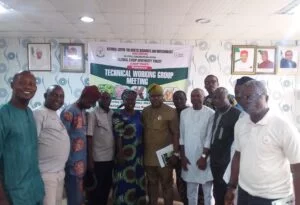Agriculture
NACGRAB: midwifing a food secured Nigeria through biotechnology

There is an area in the city of Ibadan, South-West Nigeria called Moor Plantation, named after a Colonial British High Commissioner, Sir Ralph Moor.
This location which is one of the oldest agricultural stations in Nigeria, could be referred to as the hub of agricultural institutions, research outfits, as well as agriculture education and training, in the ancient city.
In order to grow cotton to feed the British Textile Mills in 1905, the British Cotton Growers Association acquired 10.
35 square kilometres of land at the site known today as Moor Plantation.Five years later, in 1910, Moor Plantation had become the headquarters of the Department of Agriculture in Southern Nigeria.
It is also home to the first college of agriculture in the country and the whole of West Africa, the Federal College of Agriculture, formerly School of Agriculture, established in 1921.
Nestled comfortably in a serene section of Moor Plantation is the National Centre for Genetic Resources and Biotechnology (NACGRAB).
NACGRAB was established in 1987 by the Federal Ministry of Science and Technology.
Its mandate is to collect and conserve valuable genetic resources for food and agriculture and ensure that they are used sustainably.
NACGRAB is host to the National Varieties Release Committee (NVRC), as the agency serves as the committee’s secretariat.
The NVRC is responsible for scrutiny, registration, approval, and release of crop and animal varieties submitted to it by agricultural scientists, plant and animal breeders, seed companies, and research institutes among others.
The work of the committee is facilitated by NACGRAB with the required manpower and technology on and off the field to ensure its objectives and goal are actualized.
Dr Sunday Aladele, the Registrar of NVRC is also the Director of NACGRAB, at present.
In the last three years (December 2019 to January 2022) the Federal Ministry of Science and Technology released a total of 76 high yield crop varieties to Nigerian farmers through the NACGRAB based committee.
This regular release of high yield crop varieties, is to boost agriculture, make food available at cheaper rates, ensure bumper harvest at short intervals, and attain the desirable level of food security for the Nigerian populace.
A breakdown shows that 11 new crop varieties were released in December 2019, another batch of 18 varieties in December 2020, while 47 varieties were just released in January 2022.
Apart from this number, a cornucopia of other high yield crop varieties have been released during 27 meetings of the committee prior to December 2019.
At the 28th meeting of NVRC in 2019, chairman of the committee, Chief Oladosu Awoyemi said that the 11 varieties mentioned above, were approved for release out of a total of 20 crop varieties initially submitted to the Technical Sub – Committee on Crops for consideration.
Further details were given by the chairman of the crops sub – committee, Prof. Olusoji Olufajo who listed the new hybrid crops varieties as six maize, two castor, two yam, and one cowpea varieties.
Among the criteria used for the release of some of the varieties were, extra earliness and high grain yield, high protein content, high pro-vitamin A content, high yield, and tolerance to multiple stress.
Others were based on high seed yield and large endosperm, high yield, high oil content, early maturity and good oil physicochemical properties, slow rate of oxidation, good taste and high dry matter.
Good processing quality and good taste, resistance to legumes pod borer and early maturity were also taken into consideration before approval and release of some of the 11 varieties.
At the 2020 meeting, which was the 29th in the series, 18 new varieties were approved out of a total of 25 varieties submitted for consideration by research institutions, universities and private seed companies.
The varieties approved for release were two sweet sorghum varieties and four multipurpose cassava varieties.
They also included, one “poundable” cassava variety, two white maize hybrids, one yellow maize variety, and two pro- vitamin A maize varieties.
Others were, one medium maturing top – cross maize variety, two maize hybrids, and three yam varieties.
Apart from the 18 released varieties, two hybrid cotton were only registered by the Committee to serve as refuge for the released Biotechnology Cotton.
The 30th meeting of NVRC in January 2022 was a memorable event as a deluge was witnessed in the number of crops approved for release.
At the occasion, one of the highest if not the highest number of varieties in the history of the NVRC, 47 varieties, were approved for release at a sitting.
The 47 varieties were from a total of 49 varieties earlier submitted to the committee.
The released crop varieties included two rice hybrids, two high protein rich Oat varieties, three Durum wheat varieties, three pro-Vitamin A hybrid cassava, and 19 maize varieties.
It is noteworthy that when plant breeders, seed companies, and scientists come to NACGRAB, they are expected to always submit what is known as the Distinct Uniformity Stability (DUS) requirements of their crop varieties with the crops.
This is being done in order to ensure extra quality of the varieties and for them to meet international standards.
This means that all crop varieties must meet the DUS requirements of being distinct, uniform and stable for acceptance not only in Nigeria but in the West African sub-region.
Developers of crop and animal varieties bringing their samples for approval and release at NACGRAB come from within and outside Nigeria.
They include, the Institute for Agricultural Research, Zaria, the Raw Materials Research and Development Council, Abuja, and the International Institute of Tropical Agriculture, Ibadan.
Other developers are, the National Root Crops Research Institute, Umudike, the University of Ilorin, the Institute of Agricultural Research and Training Ibadan; and Seed Co. Nigeria Ltd.
The International Maize and Wheat Improvement Center, Kenya, Bayer Crop Science , Petit, South Africa, and the African Agricultural Technology Foundation, Kenya are also among developers of many varieties released so far.
The diverse origin of these plant breeders, scientists, seed companies and researchers is a testimony to the quality and global standard of NACGRAB’s outputs.
The committee is also responsible for the approval and release of animals, fish, and livestock of enhanced breeds.
But, in this area, not much success has been recorded as breeders are not forthcoming with samples and the NVRC can not approve and release what is not presented before it.
However, the committee has been persistent in its call on stakeholders to submit samples of animals, livestock and fishes of improved quality to it for approval and release.
Looking at its consistent activities so far, the NVRC seems to be the foremost committee under the umbrella of NACGRAB that is strategically midwifing the food security goal of the Federal Government for the masses.
This assertion is backed by the fact that high yield crop and animal varieties derived through biotechnology have been identified by many experts, as solutions to global hunger and malnutrition.
From the foregoing, it is apparent that for over 30 years, NACGRAB have really been working tirelessly to boost Nigeria’s agricultural productivity.
Some observers are also of the view that what NACGRAB’s effort, which is in line with President Muhammadu Buhari administration’s 9-point agenda, needs; is sustainability. (NANFeatures)
**If used, please credit the writer as well as News Agency of Nigeria (NAN)
Agriculture
Sallah: Ram Traders Lament Rising Preference to Cows

Some ram traders in Lagos State have lamented the preference for cows to rams by Muslim faithful this 2025 Eid Kabir celebration.
The traders disclosed this in interview on Thursday in Lagos.
The traders said that most people prefer to buy cows than rams because of the size and the fact that five families could buy and share for the celebration.
“A ram trader, Mr Ibrahim Hassan, at the Lawanson area of the state, said patronage has been decent, but with an interesting twist.
“The patronage this year is not bad, but I have noticed that people are buying more cows than rams. I believe the reason behind this shift is that cows are more economical and offer better value for money.
“When families or even groups of friends come together, they can share a cow and still fulfil the sacrifice. That way, instead of each person buying a ram for over N500,000, they split the cost.
“The cheapest cow you can get right now is around N800,000, while the cheapest ram starts at about N550,000. Prices also vary depending on the size and weight of the animal.
“I have contacted my sources for more cows, but the market price has gone up since last week. It’s a volatile market, and prices can change quickly,” Hassan said.
Also, Mr Shakiru Gbadamosi, another ram seller at Lawanson, said he noticed that “people are weighing their options this Sallah, and they have been buying more of cows”
“I was surprised to see some buyers turning to cows, and this trend has been on for weeks. Although many still prefer rams for Sallah because it’s about tradition and religious significance.
“The ram is the symbolic animal for the sacrifice, and that’s not something easily replaced.
“Prices have gone up this year, a decent ram now costs between N550,000 and N700,000 depending on the size and breed. But despite that, the demand remains steady.
“Some people have been buying younger rams because they are less expensive but still acceptable.
“The younger rams are sold for between N130,000 and N250,000,” Gbadamosi said.
A buyer, Mr Folajimi Aderibigbe, who confirmed the trend, said buying a cow seems like a better option.
“We are a family of eight, and instead of buying two small rams, we joined with my brother-in-law and bought a cow. It cost us N950,000, but we split it. Everyone still gets to perform their sacrifice and save money.
“Traditionally, rams are the preferred animal for Eid Kabir (Sallah). However, economic realities have changed things, and we must find a way to adapt,” he said.
In a related development, vegetable oil traders said they have observed increased patronage due to the Sallah celebration.
Mrs Linda Nwachukwu, a cooking oil trader at the Lawanson Market, said the demand for cooking oil had increased because of preparations ahead of Sallah.
“The celebration usually increases the demand for groundnut oil. Consumers have been stocking up oil since last week, especially now that there are few days to Sallah.
“Cooking oil prices have risen, but it is cheaper than last December, a 25-litre container cost N110,000, a price that persisted until April 2025.
“A recent price adjustment, just three weeks ago, sets the current rates for groundnut oil at N78,000 for 25 litres, N35,000 for 10 litres, and ₦18,500 for five litres.”
“This is unusual, groundnut oil prices normally surge in December and then decrease by January or February, but it stayed high for a long time,” she said.
Another trader, Mrs Imoleayo Fakunle, said she buys in larger jerrycans and sell in measured portions to customers who cannot afford bigger sizes.
“Not everyone can buy 25 litres or even afford the branded ones, so as a vendor, what I do, is to buy in larger containers and sell in small portions.
“Groundnut oil is expensive, but it is essential. A lot of customers have been buying the measured portions, and they are always happy that they can save money.
“Despite rising prices, customers prioritise the essential ingredient for their celebrations,” she said.
Mrs Taraoluwa Alausa, a consumer at the Idi-Araba Market, said she had learned to prioritize when buying cooking oil since the increase in the price of groundnut oil.
“I purchase measured portions of oil specifically for frying and use a good branded oil for general cooking.
“Lately, I have become more conscious about the type of oil I use. I want something natural and less processed. It’s a bit pricier, but I think it’s good for healthy living.
“However, for this celebration, there is going to be an exception because I will be frying with the measured portions I bought. This way, I can save more and even fry more,” Alausa said. (NAN)
Agriculture
Tiv Monarchs Give Herders Ten Days Ultimatum To Vacate Tiv Kingdom

By David Torough, Abuja
The Tiv Area Traditional Council during its emergency meeting held yesterday in the palace of the Tor Tiv in Gboko requested the Governor Hyacinth Alia led administration to create an enabling environment to allow herders’ peaceful exit of farmlands in Tiv Kingdom to facilitate resumption of farming activities.
Consequently, the Council directs political and traditional rulers in each local government area of Tiv Kingdom to peacefully engage the herders to ensure their exit from the local government areas to allow farming resumes.
The Council which was chaired by the Tor Tiv himself, HRM Prof James Ortese Iorzua Ayatse CFR equally appealed to all herders in Tiv Kingdom in Benue State to vacate all Tiv lands before the end of May 2025 to allow farmers return and cultivate their farms in order to avoid the looming hunger in Nigeria.
According to a Communique signed by the Secretary of the Council Mr Shinyi Tyozua which deliberated particularly on the security situation in Tiv Kingdom the Council enumerated the communities worst affected to include those in Kwande, Katsina Ala, Logo, Ukum, Guma, Makurdi, Gwer West Gwer East and Buruku Local Government Areas.
The Council lamented that farming activities in the kingdom have ceased due to the occupation of farmlands by herders for grazing and attacks and killings of farmers who fled stressing that if the situation continues it will ultimately result to hunger in Tiv Kingdom and Nigeria as a whole.
Agriculture
Ondo Govt. Destroys 200kg Seized Cocoa Adulterants

The Ondo State Government, on Thursday, destroyed 200kg adulterants used for adulteration of cocoa beans, seized from a merchant in Ondo West Local Government Area of the state.
Mr Segun Odusanya, Permanent Secretary in the Ministry of Agriculture and Forestry (Forestry and produce sub section), supervised the destruction of the 200kg bags of seized adulterants.
Odusanya explained that the destruction was part of government efforts to ensure that the state maintained quality cocoa production in the country.
“Mr governor, Lucky Aiyedatiwa, has reiterated the commitment to ensure the state remains the highest producing state with good cocoa quality
“Anyone caught engaging in illegal activities will be prosecuted accordingly.
“Moreover, this action was embarked on to warn cocoa merchants, who intend to engage in illegal activities, to rethink before getting into it.
“We are going to seal any store caught in such illegal activities, the products will be burnt while the merchant will be prosecuted according to the laws of the land.
“If we are saying we are the highest cocoa producing state and we continue to encounter this scenario, it will give us a bad publicity.
“The bad publicity will be in the country and extend to the international market, and we don’t want that,” he said.
The permanent secretary, therefore, commended Aiyedatiwa for graciously approving the recruitment of 60 new staff to checkmate the activities of cocoa merchants in the state.
“Mr governor has supported us, he has said we should recruit more people to guide against any adulteration and ensure we have a good quality cocoa beans.
“I must commended our task force committee for ensuring that the state holds its position in the country and the international market,” he said.
Earlier, Mr Tunji Akinnadeju, a Director of Produce (DP3) in the Grading and Allied Department of the ministry, said the adulterants were intercepted at Ondo West Local Government Area of the state.
Akinnadeju said that the owner of the adulterants took to his heels at the time of arrest.
“As we all know that cocoa is being sold in weight and after adding all these things, it will be sold at high prices, which is not good enough.
“So, doing that will bring a lot of damage to the image of the state and the country at large in the international market,” he said.
Also, Mr Sunday Adegbola, a Director of Produce Licensing in the ministry, said the merchants’ actions could affect people during consumption of the cocoa products, if care was not taken.
Adegbola, who pledged that the ministry would not rest until the state was free from adulterated cocoa beans, said the nefarious action could be attributed to the price tag at the international market.
“It is the price at the international market and the price is better for the farmers, not for the people who use adulterants.
“With this action, many people will drink cocoa as a chocolate powder and other materials from cocoa beans which has been adulterated.
“The consumption of these chemical products will also affect humans,” he said. (NAN)























